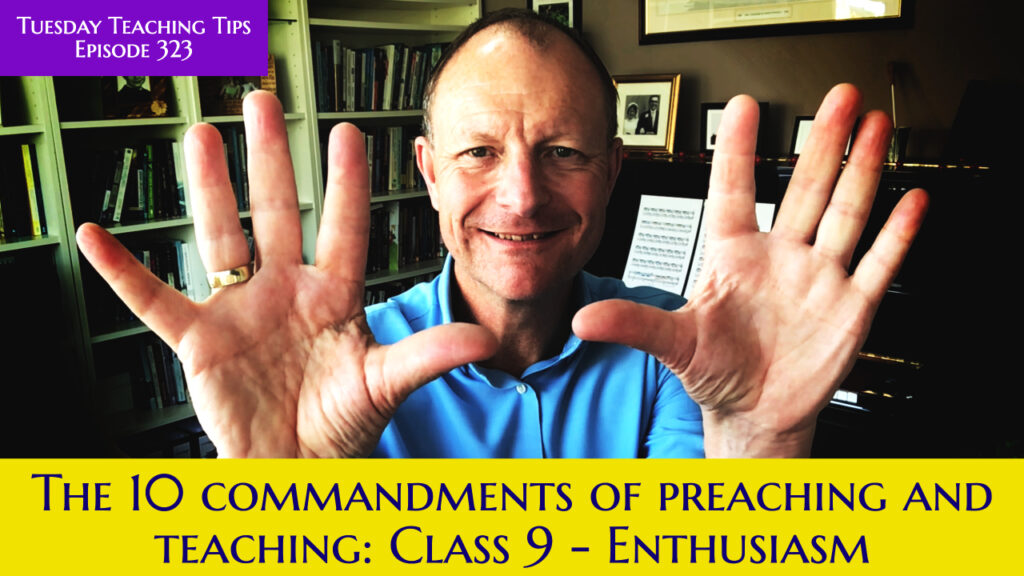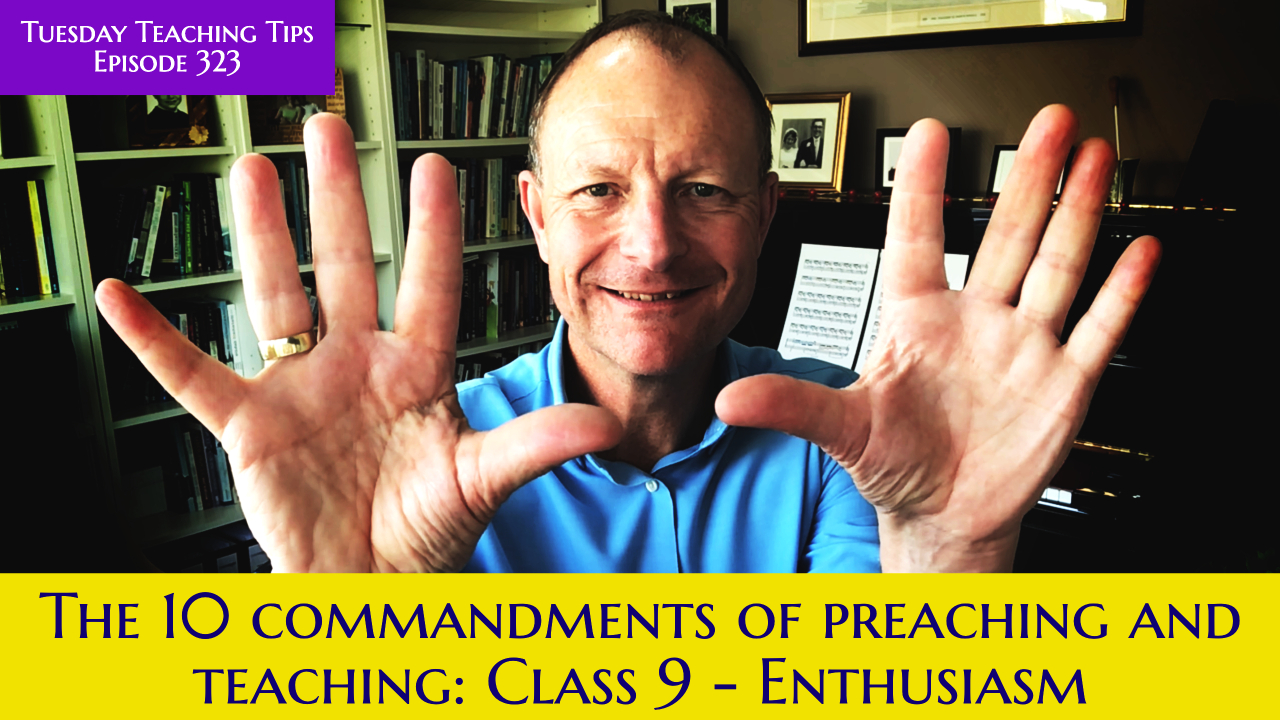8th Commandment: Enthusiasm is infectious!

Introduction
Do you ever wonder if your teaching is effective? Do you sometimes sense your preaching might not have the impact you had hoped? If so, you are like 99% of the speakers I know. The other 1% are deluded.
“At Iconium Paul and Barnabas went as usual into the Jewish synagogue. There they spoke so effectively that a great number of Jews and Greeks believed.” (Acts 14:1 NIV11)
Point of clarification
I vividly remember my wife telling me after church one day, “I don’t like it when you shout”. At the time I argued the point claiming that I was not shouting, simply excited. On reflection (and listening to the tape – yes, it was that long ago), I had to agree with her. What in my ears was ‘enthusiasm’ was in her ears shouting. I was confusing volume with enthusiasm. The two are not the same. There is a place for shouting — “My lips will shout for joy when I sing praise to you, I whom you have delivered.” (Psalm 71:23 NIV11) — but it is rarely in preaching. Public speaking is a conversation more than a presentation, and shouting is a conversation killer. However, talking too quietly can be just as problematic.
In his blog, Leith Anderson writes, ‘Volume ranges come with diminishing returns. If a voice is too soft we can’t make out the words. If a voice is too loud we just hear the noise. Too soft is irritating; too loud is painful.’ (https://www.nae.org/so-loud-i-cant-hear-you/) When we are discussing enthusiasm we are not addressing volume, but something much deeper. You might like this article about the great preacher Charles Spurgeon — https://www.spurgeon.org/resource-library/blog-entries/10-public-speaking-tips-from-charles-spurgeon/.
4 Tips
- Pray. In the days leading up to the delivery of the lesson pray that God would help you to connect the Scripture with your heart, mind and life. When you see the beneficial effects of living what you are about to teach, your enthusiasm will be natural. It will flow from the conviction of knowing God’s word is ‘alive and effective’ (Hebrews 4.12). This first tip is about how to become enthusiastic in a healthy way.
- Prepare. Examine your lesson in advance to identify the key points you believe God wants you to get across. Those will be the ones that deserve your greatest enthusiasm. Do not put your enthusiasm into minor issues, interesting or exciting as they may be. If you are enthusiastic about everything, then nothing is important. Reserve your greatest enthusiasm for God’s greatest points. You might want to highlight those points in red or mark them out in some way.
- Spontaneity. As good as it is to prepare, one must allow for the movement of the Spirit during a talk. Pray in advance to discern when God’s Spirit is moving to prompt you to greater enthusiasm about something that you may not have prepared in advance.
- Exaggerate. When speaking to others it is important to be yourself, but you need to be more of yourself — especially when speaking to a larger group. Exagerrating gestures, bodily movements, facial expressions and voice inflexions are not fake if done in service of your listeners. The enthusiasm we are describing is not designed to draw attention to yourself, but to your message. As Richard Venables puts it in his book, Worship Leading Essentials, ‘The best sermon is that in which the theme absorbs the preacher and hearers, and leaves no one either time or desire to think about the speaker’. This second tip is about how to express enthusiasm in a healthy way. Praying will help with this point.
Conclusion
Jesus was enthusiastic. Sometimes he was loud. It’s hard to imagine how he spoke to 5,000 people without significant volume (Matthew 14). Sometimes his enthusiasm was physical. Turning over the tables in the temple courts and speaking to the crowd while the adrenaline was still in his system must have been quite the sight (Matthew 21:12-13)! But whether he was speaking or acting with volume or physicality, he was all-in. I think that’s the main point. Do your listeners sense what you are speaking about matters to you?
Next week: 9th Commandment: It doesn’t matter how well you taught it, it matters how well they learned it.
Consider joining AIM UK&Ireland to develop your understanding of Scripture: https://aimukandireland.com/. Our next module is Homiletics (the preparation and delivery of lessons).
Please add your comments on this week’s topic. We learn best when we learn in community.
Do you have a question about teaching the Bible? Is it theological, technical, or practical? Send me your questions or suggestions. Here’s the email: malcolm@malcolmcox.org.
If you’d like a copy of my free eBook on spiritual disciplines, “How God grows His people”, sign up at my website: http://www.malcolmcox.org.
Please pass the link on, subscribe, and leave a review.
“Worship the LORD with gladness; come before him with joyful songs.” (Psalms 100:2 NIV11)
Keep calm and carry on teaching.
God bless, Malcolm



